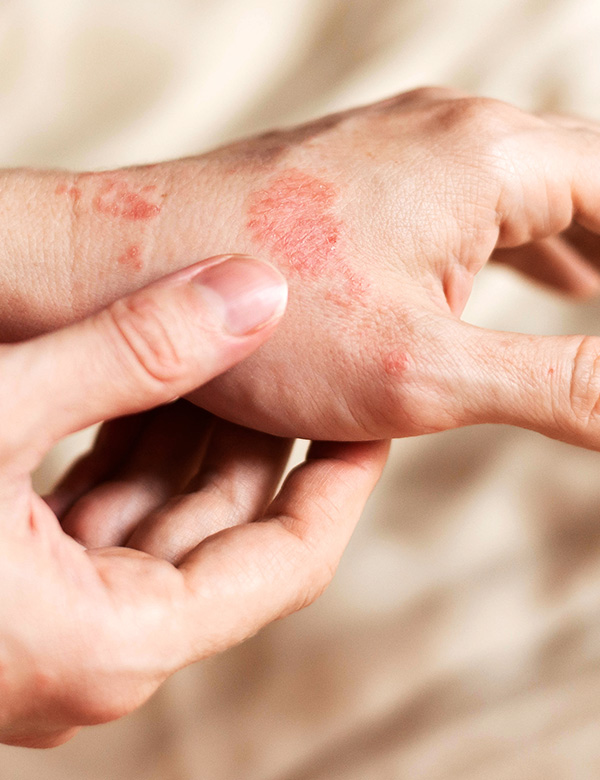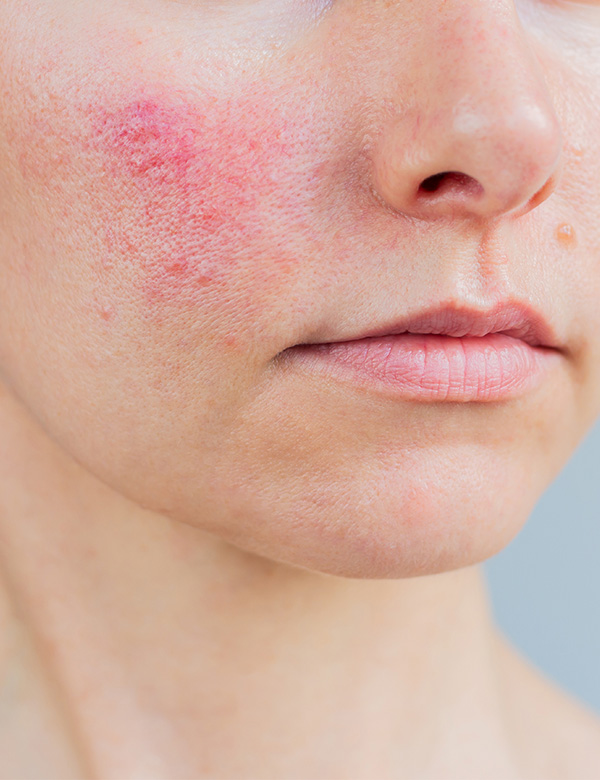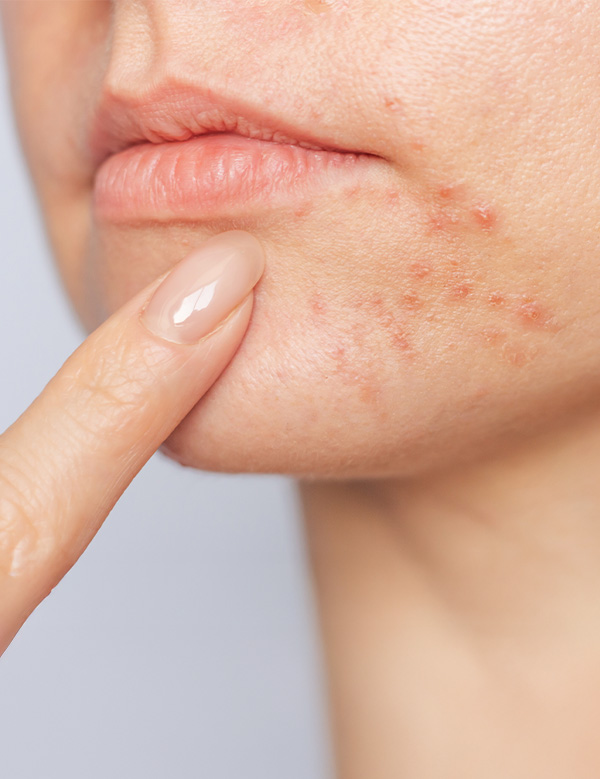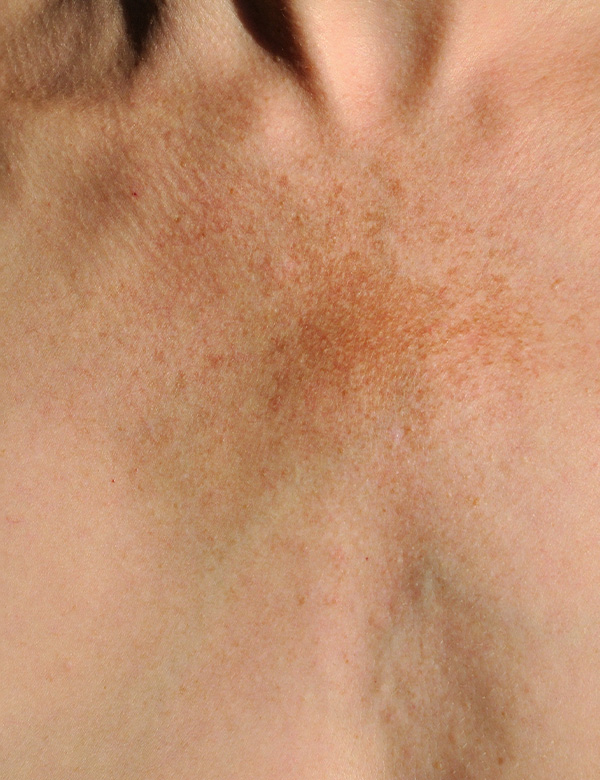Psoriasis
Psoriasis: Diagnosis and treatment by experienced dermatologists at Derma Medical Clinic in Zurich - Sihlcity
Psoriasis
Chronische Abszesse und schmerzhafte Knoten durch erfahrenen Hautarzt abklären und behandeln in der Derma Medical Clinic in Zürich - Sihlcity
Redness, flaking and itching – treating psoriasis with medical creams, light therapy or medication
Examinations
Dermatological examination
Assessment of possible triggers
Process
Initial consultation & skin analysis
Treatment with light, cream or medication
Duration
approx. 20–30 minutes
What is psoriasis?
Psoriasis (also called psoriasis vulgaris) is a common skin condition. It happens when skin cells renew much faster than normal, often due to a misdirected immune response. This leads to inflamed, red patches covered with silvery-white flakes.
Psoriasis often appears on the elbows, knees, scalp or back. The disease usually comes in phases: After a time without symptoms, flare-ups can occur repeatedly.
This skin check is especially recommended if…
- Red, scaly patches appear on areas like the elbows, knees, scalp or back
- Affected skin areas cause itching, burning or a tight feeling
- Symptoms don’t improve with regular care or get worse
- There is a family history or you also experience joint pain

What is psoriasis?
Psoriasis (also called psoriasis vulgaris) is a common skin condition. It happens when skin cells renew much faster than normal, often due to a misdirected immune response. This leads to inflamed, red patches covered with silvery-white flakes.
Psoriasis often appears on the elbows, knees, scalp or back. The disease usually comes in phases: After a time without symptoms, flare-ups can occur repeatedly.
Who should get psoriasis checked and treated?
This skin check is especially recommended if…
- Red, scaly patches appear on areas like the elbows, knees, scalp or back
- Affected skin areas cause itching, burning or a tight feeling
- Symptoms don’t improve with regular care or get worse
- There is a family history or you also experience joint pain
Treatment
At Derma Medical Clinic, we start every check-up with a detailed conversation. The dermatologist will then closely examine the affected skin, sometimes using a special magnifying tool.
If you have joint discomfort, we can also check for a possible condition called psoriatic arthritis.
We take your previous treatments and skincare routine into account when making our assessment.
What does the treatment involve?
Treatment depends on the severity and the condition of your skin.
For mild cases, we use creams or ointments to reduce inflammation and remove scaling. If larger areas are affected, light therapy is often used. This involves exposing affected areas to UV light for a few minutes over a series of sessions.
UV light can help calm irritated skin. It relieves itching, slows rapid skin renewal and gently reduces inflammation.
For more severe or persistent symptoms, medications are considered. These can help reduce excessive inflammatory reactions in the body.
How does psoriasis treatment work?
Personal consultation and skin analysis
During the first appointment, we talk with you about your symptoms, past treatments and skincare routine. Then, the dermatologist examines your skin carefully—visually and with a special magnifying tool.
Treatment planning
Based on the skin findings, we’ll discuss the next steps. We’ll clearly explain your treatment options — from medical creams and light therapy to medication, depending on how severe your symptoms are.
Treatment planning and therapy
We begin light therapy directly at the clinic. If medications are needed, we guide you closely at the start. If helpful, our skin therapist (medical aesthetician) will support treatment with calming skin applications.
Long-term care
Psoriasis tends to come and go, which makes flexible treatment important. Through regular check-ups, we track how your skin responds, adapt treatment if needed, and advise you on skincare and triggers.

Psoriasis treatment at Derma Medical Clinic is exclusively provided by experienced dermatology specialists:
- Dr. Benjamin Miller, specialist in dermatology and phlebology
- Dr. Markus Dendorfer, specialist in dermatology and paediatric dermatology
Both have many years of experience diagnosing and treating eczema — from mild to more severe cases.

Dr. med. Markus Dendorfer
Board-certified Specialist in Dermatology & Venereology FMH

Dr. med. Benjamin Miller
Board-certified Specialist in Dermatology & Venereology FMH
What you can expect from us
Years of experience with chronic skin conditions
Our dermatologists have supported people with psoriasis for many years — from the first symptoms to long-term stabilization. We understand how differently the condition can affect each person and we provide thorough evaluations.
Modern light therapy (UVB / PUVA) directly in our clinic
In our clinic, we use the latest equipment to treat affected skin areas with UV light. Treatments happen conveniently on site — with no extra travel or referrals.
Medication treatments (including biologic medicines) for severe cases
When the skin is severely affected or other treatments aren’t enough, we use biologic medicines (biologics). These are newer therapies that help calm the body’s inflammatory response and reduce psoriasis symptoms.
Everything under one roof
You get diagnosis, medical treatment and support from our skin therapist at one place. This means familiar contacts, short paths and coordinated care — from the first consultation through follow-up care.
You don’t have to live with scaly, red skin and constant itching.
Book your diagnosis appointment now at Derma Medical Clinic in Zurich – Sihlcity.
FAQ – Frequently asked questions about psoriasis
What is psoriasis?
Psoriasis is a chronic skin condition where skin renews much faster than normal. This creates inflamed, red and scaly patches — often on the elbows, knees or scalp. It’s not contagious and usually comes in flare-ups.
Is psoriasis contagious?
No. Psoriasis cannot be passed on to others. It’s an autoimmune disease, where the immune system mistakenly causes inflammation in the skin.
What causes psoriasis?
The exact causes of psoriasis aren’t fully understood. Genetics often play a role. Triggers like stress, infections, certain medications or skin irritation can lead to a flare-up.
How can I recognize psoriasis?
Typical signs include clearly defined red patches with silvery-white flakes. They may itch or burn and often appear on the scalp, elbows, knees or lower back — nails can also be affected.
How is psoriasis treated?
Treatment depends on severity: For mild cases, creams and ointments help. For more severe cases, light therapy or medications are used — including modern biologic medicines that target inflammation processes in the body.
What kind of skincare is best for psoriasis?
Gentle, moisturizing skincare with mild products supports the skin barrier, eases itching and may reduce flare-ups. It’s important to care for the skin regularly and avoid irritation — based on your skin’s needs.
Is there a special diet for psoriasis?
Some people notice improvements with anti-inflammatory diets — such as cutting back on sugar and alcohol and eating foods rich in omega-3 fatty acids. There’s no one-size-fits-all advice, but individual guidance may help.
Is psoriasis curable?
Psoriasis isn’t curable, but it can be managed very well. Thanks to modern treatments, many people live with few or no symptoms.
When should I see a dermatologist for psoriasis?
If skin changes spread, itch severely or don’t respond to care, it’s time to see a dermatologist. Early diagnosis helps manage symptoms more effectively.
Can psoriasis affect the joints?
Yes. Around 20–30% of people with psoriasis also develop psoriatic arthritis. This can cause joint pain, swelling or stiffness — early diagnosis is important.



